跨文化交际实用教程unit4课件
- 格式:ppt
- 大小:1.38 MB
- 文档页数:92

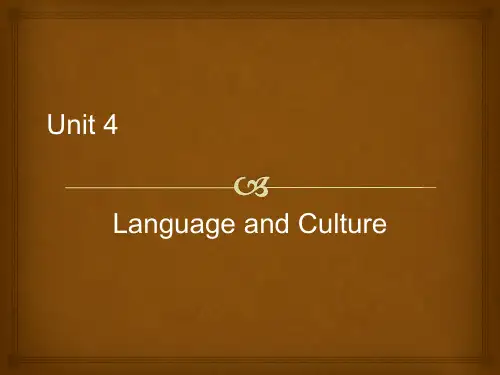


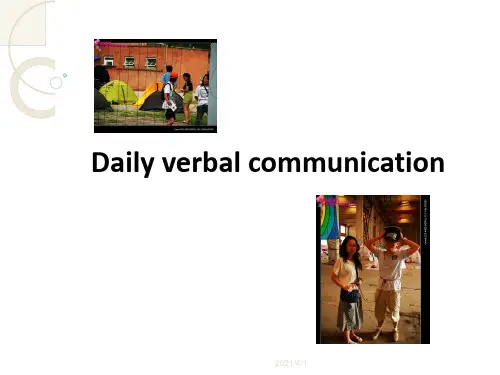
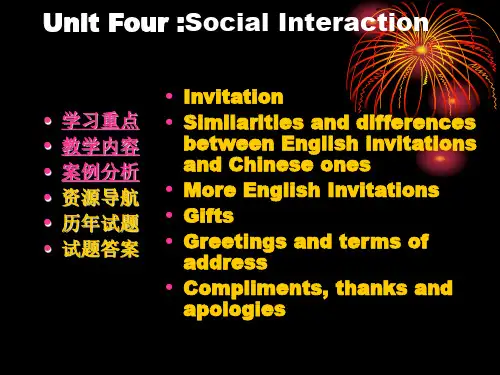
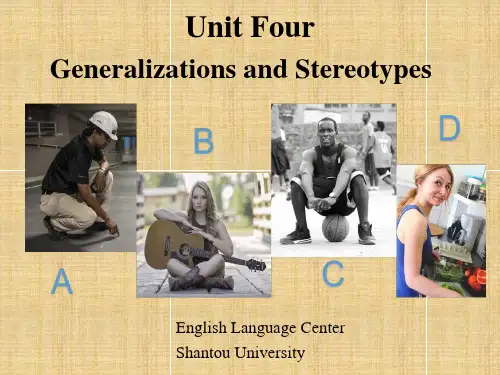
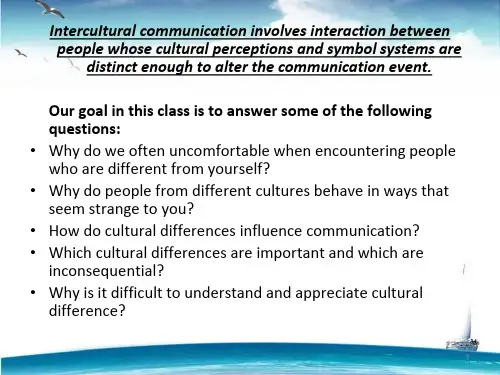

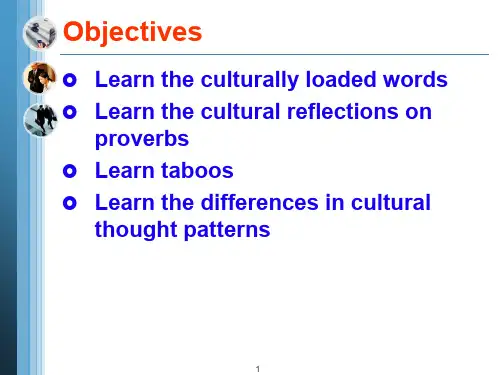
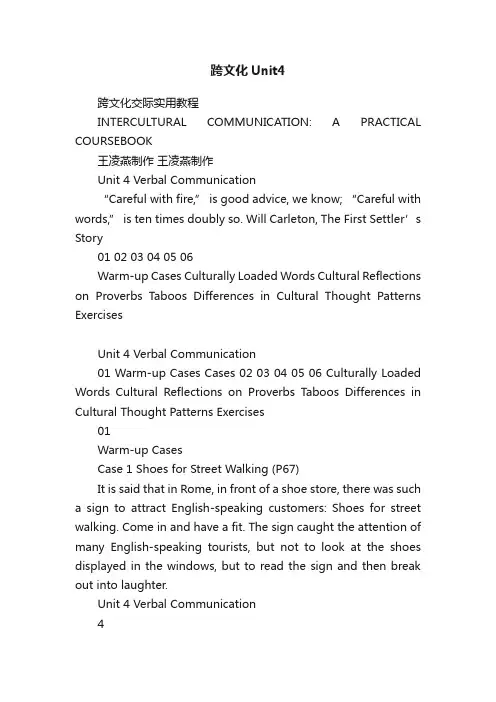
跨文化Unit4跨文化交际实用教程INTERCULTURAL COMMUNICATION: A PRACTICAL COURSEBOOK王凌燕制作王凌燕制作Unit 4 Verbal Communication“Careful with fire,” is good advice, we know; “Careful with words,” is ten times doubly so. Will Carleton, The First Settler’s Story01 02 03 04 05 06Warm-up Cases Culturally Loaded Words Cultural Reflections on Proverbs Taboos Differences in Cultural Thought Patterns ExercisesUnit 4 Verbal Communication01 Warm-up Cases Cases 02 03 04 05 06 Culturally Loaded Words Cultural Reflections on Proverbs Taboos Differences in Cultural Thought Patterns Exercises01Warm-up CasesCase 1 Shoes for Street Walking (P67)It is said that in Rome, in front of a shoe store, there was such a sign to attract English-speaking customers: Shoes for street walking. Come in and have a fit. The sign caught the attention of many English-speaking tourists, but not to look at the shoes displayed in the windows, but to read the sign and then break out into laughter.Unit 4 Verbal Communication401Warm-up Casesa street walker ------ a prostitute to have a fit ------ to become suddenly and violently angry or upset (勃然大怒) Unit 4 Verbal Communication501Warm-up CasesCase 2 A Misunderstanding Caused by a Joke (P67)Roger was the Personnel Executive of a large American multinational firm. In 1996, Roger was working in Brazil to help promote their business. One evening, there was a party, attended by both his employees from the United States and many Brazilian business people. At the party, Roger bumped into Rosalita, a Brazilian woman he had known for some time. Roger generally had a very good impression of Rosalita and always felt at ease with her, so that he felt free to tell jokes and share personal thoughts, and talk about Brazil and Brazilian life without having the jitters of offending Rosalita. During the party, Rosalita said to Roger, “I’d like to introduce you to one of my good friends. She is a very capable woman and is presently thinking of working in a joint venture so she can provide a better living for her large family. She is very much interested in your company.” Hearing that, Roger smiled and replied, “OK, but I just hope I don’t get hustled.” Unfortunately, Roger’s reply made Rosalita quite upset. Very soon she excused herself as politely as she could, and did not speak with Roger for the rest of the evening.Unit 4 Verbal Communication601Warm-up Casesto force sb. to make a decision before they are ready or sure to work as a prostitute; romance or sex is hintedUnit 4 Verbal Communication701Warm-up CasesCase 3 Look Out (P69)A foreign student in the U.S. was sitting by a window reading a book. She heard someone yelling “Look out!”, so she stuck her head out of the window. Just then a board hurtled down from above, narrowly missing her. She looked up, half in anger and half in fright. There was a man on the roof doing repairs. “Didn’t you hear me call ‘Look out’?” he demanded. “Yes, and that’s what I did,” she replied.to be careful, especially when there is dangerto stick your head outside of sth.(window/door) to take a lookUnit 4 Verbal Communication8Unit 4 Verbal Communication01 03 04 05 06Warm-up Cases02 Culturally Loaded Words Cultural Reflections on Proverbs Taboos Differences in Cultural Thought Patterns Exercises02Culturally Loaded WordsA beautiful womanUnit 4 Verbal Communication1002Culturally Loaded WordsDoes “dragon” mean the same to a Westerner as “龙” to a Chinese?In Chinese culture, “龙” is a totem['t??t?m] with many royal association, such as “龙颜”, “龙床”, “龙袍”, “龙心大喜”. Unit 4 Verbal CommunicationThe associations of “dragon” to Westerners are horrible, disgusting monsters.1102Culturally Loaded WordsUnit 4 Verbal Communication1202Culturally Loaded WordsUnit 4 Verbal Communication1302Culturally Loaded WordsDoes “知识分子” have the same meaning as “intellectual”?In CC, it refers to people including college teachers, college students, middle school teachers, and such people as medical doctors, engineers, interpreters who have had a college education. ? In EC, it includes only people of high academic statussuch as college professors, not ordinary college students. (Cover a much smaller range of people.) (Not always a complimentary term, sometimes used in derogatory[d?'r?g?t(?)r?] sense.) Unit 4 Verbal Communication1402Culturally Loaded Words干部cadreIn EC, “cadre” is not a common word, and many Englishspeaking people do not know what it means. ? Some other substitutes: official, functionary, administrator, etc. But none of these gets exact same meaning as Chinese word “干部”.Unit 4 Verbal Communication1502Culturally Loaded Words社会科学Social Sciences“社会科学” covers all the fields except the ones in the natural sciences and applied sciences. It would be the same to “the humanities” in English: language, literature, philosophy, etc. ? The English term “social sciences” covers a smaller area of learning. It includes political science, economics, history (which is often classified under the humanities), and sociology ----the branches of learning that study human society, especially its organization and relationship of individual members to it.Unit 4 Verbal Communication1602Culturally Loaded Words Generic termchicken duck goose horse cattle/cow pig dog sheep deerName for malecock, rooster drake gander stallion bull boar dog ram stag Name for femalehen duck goose mare cow sow bitch ewe doeName for the chick youngduckling gosling foal calf shoat puppy lamb fawnWith certain less common animals and birds, “bull” or “cow” and “cock” or “hen” are frequently used to distinguish sex, e.g. bull seal, cow seal; bull elephant, cow elephant; cock pheasant, hen pheasant; cock sparrow, hen sparrow. Also, using the term “male” or “female”, or someti mes “she” with the generic name, is acceptable, as in “male leopard”, “female panda”, “she wolf”, etc. Unit 4 Verbal Communication1702Culturally Loaded WordsChinese Terms in English viceassociate assistant 副deputy lieutenant [lu't?n?nt] underExamples in English vice-chairman, vice-president associate professor, associate director assistant manager, assistant secretary deputy director, deputy chief-of-staff lieutenant governor, lieutenant general undersecretary (of, U.S.) Unit 4 Verbal Communication1802Culturally Loaded WordsUnit 4 Verbal Communication1902Culturally Loaded WordsThe major semantic differences between English and Chinese terms might be grouped as follows:A term in one language does not necessarily have a counterpart in the other language;(干部) ? Words or terms in both languages appear to refer to the same object or concept only on the surface, but actually refer to quite different things;(龙) ? Things or concepts are represented by one or perhaps two terms in one language, but by many more terms in the other language, i.e. finer distinctions exist in the other language;(副) ? Terms have more or less the same primary meaning, but have secondary or additional meanings that may differ considerably from each other. (hustle)Unit 4 Verbal Communication20Unit 4 Verbal Communication01 02 04 05 06Warm-up Cases Culturally Loaded Words03 Cultural Reflections on Proverbs Taboos Differences in Cultural Thought Patterns Exercises03Cultural Reflections on ProverbsProverbs may provide interesting glimpses or clues to a people’s geography, history, social organization, social views,etc. People who live along coasts and whose livelihood is dependent on the sea will definitely have proverbs about sailing, about braving the weather, and about fish and fishing. Nomadic people will have sayings about the desert or pasture, about sheep and horses or camels, and about wolves and jackals. In cultures where old age is revered, there will be proverbs about the wisdom of the elders, and in societie s where women’s status is low, there will be a number of demeaning sayings about woman.Unit 4 Verbal Communication2203Cultural Reflections on ProverbsThe proverbs show the similarities of human experiences and observations 新官上任三把火。